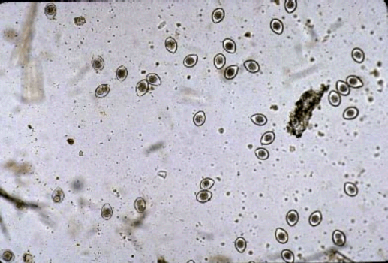|
Coccidiosis is caused by Isospora species, another common protozoal organism in dogs and cats. The pet is usually infected by ingesting infective oocysts from the environment. The coccidia invade and destroy the epithelial cells in the gastrointestinal tract which results in diarrhea and vomiting. This parasite is rigidly host specific, in that, dog coccidia can not infect cats, and vice versa. This parasite is not contagious to humans.

The life cycle of Coccidia is complex. Dogs or cats ingest infective coccidia, sporulated oocysts or a paratenic host ( mice, rats, hamsters, dogs, cats, opossums, cattle ) containing monozoic cysts. In the presence of bile, the oocysts release sporozoites which invade the intestinal wall. Some enter mesenteric lymph nodes or other tissues and form monozoic cysts that remain viable for extended periods of time in the definitive and paratenic host. Sporozoites that invade the crypt cells of the intestine undergo 2-4 generations of schizogony, asexual reproduction. The schizont releases many merozoites that infect nearby cells. Gametogony, sexual reproduction, occurs producing microgamonts and macrogamonts. Fertilization takes place producing a zygote which becomes an oocyst that is released in the feces. Sporogony occurs in the external environment producing infective sporozoites.
Treatment is available and consists of using medications to cause the cessation of oocyst production and remission of diarrhea. No medicine "kills" the coccidia, but it will interrupt/stop the reproductive cycle.
|





